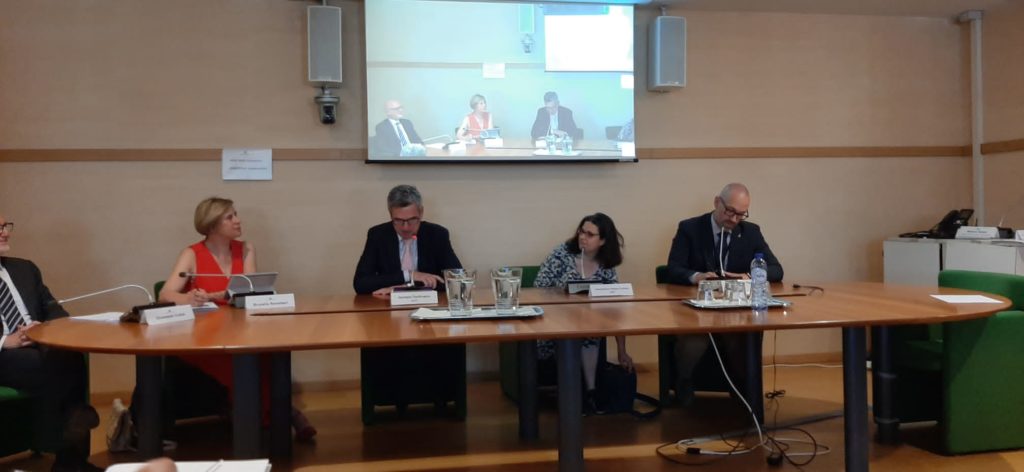Promoting Higher Vocational Education and Training in EUSALP countries: the way forward
24/05/2022

On 18 May, in Brussels, the Italian EUSALP 2022 Presidency, in collaboration with the Lombardy Region, organized a public event on the cooperation on higher vocational training in the context of the European Union and EUSALP countries. It was a great occasion to discuss future perspectives of cooperation in HVET in the Alpine region. The EU Vocational Skills Week offered the perfect context to discuss the importance of initiating a process of mutual recognition of HVET titles at the European level, in line with the recent Council recommendation on building bridges for effective European higher education cooperation (2022/C 160/01). The value of enhancing cooperation in HVET was recognised by both the experts and politicians intervening in the event.
Ms Vanessa Debiais-Sainton (DG EAC) stressed the importance of creating alliances between HVET institutions for the development of joint programmes and to reinforce the European dimension of higher education. To this end, dedicated Erasmus+ pilot calls will be launched next Summer.
Noelia Cantero (EARLALL) underlined the role of regional authorities and their multiplier effect for the involvement of local stakeholders in cooperative processes such as the mutual recognition of HVET titles. She reiterated the need to identify shared criteria and common standards to build cooperation and the centrality of trust in such a process. She praised the dynamism that the Autonomous Province of Trento is showing in leading initiatives and projects on dual training and HVET.
Matteo Colombo (ADAPT and in collaboration with INDIRE) outlined the different experiences of higher vocational training systems in EUSALP countries and discussed the added value of collaborating on HVET in order to tackle the heterogeneity (including classificatory) of these pathways at the international level, and invite the development of mutual recognition processes and agreements aimed at improving the comparison between the different H-VET systems in EUSALP countries. A holistic approach, capable of moving beyond the traditional differences (and distances) between academic and non-academic tertiary education, is increasingly being addressed to develop, in an ecosystemic logic, alliances between H-VET and Academic institutions and facilitate the mobility of students and workers across EU countries in order to address the challenges connected to a greener, more inclusive and more digital society.
All relevant stakeholders operating at the European and national levels should aim to launch the debate towards a future adoption of a pact for HVET in line with the European Skills Agenda and the European Strategy for Higher Education.
The political roundtable included three Members of the European Parliament who participate in the Friends of EUSALP initiative, namely Gwendoline Delbos-Corfield (France), Herbert Dorfmann (Italy), Alessandro Panza (Italy). Their presence, with a clear political support, enhanced this process of cooperation that is intended to be initiated from the political point of view.
Introductory greetings were given by the Lombardy Region Councilors, Raffaele Cattaneo (Councilor for Environment and Climate, Delegate for EUSALP) and Melania De Nichilo Rizzoli (Councilor for Training and Employment), while Mirko Bisesti, Councilor for Culture, Education and Universities of the Autonomous Province of Trento and Delegate of the EUSALP Italian Presidency 2022, focuses on the Trentino system and on the Important contributions and urges came from today’s discussion so that reciprocal actions can be put in place to promote the start of a path for the recognition of degrees within the Alpine area. This is an important challenge that national and European politicians and stakeholders have recognized in the strategic role of high vocational education and training to ensure the transition from the world of education to the world of work and for the development of entrepreneurship and systems innovation in general.
The goal is the strengthening of the educational offer both in terms of the quality of training and the diversification of training paths thus ensuring greater attractiveness to the system of higher vocational training so that it can be clearly identified as a highly qualifying path both from the point of view of employment prospects and the completion of studies. The Province of Trento intends to invest in the development of a new model that finds an effective governance capable of gathering the strongest partners with whom to co-design the training pathways.
Julie Thiran of the European Commission’s Directorate General REGIO, who is also the contact person for the Alpine macro regional-strategy, closed the proceedings underlining the urgent need for a new agreement in the EUSALP area, the time for action is come!




